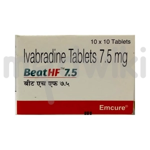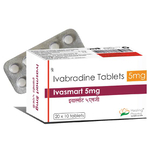ivabeat
Introduction to Ivabeat
Ivabeat is a prescription medication primarily used to manage certain heart conditions. It contains the active ingredient Ivabradine, which is known for its ability to reduce the heart rate, thus alleviating symptoms and improving heart function. Designed for patients with chronic heart failure or angina, Ivabeat plays a crucial role in improving quality of life and reducing the risk of hospitalization due to heart-related issues. This medication is available in tablet form, ensuring ease of administration and consistent dosing for effective management of heart conditions.
Composition of Ivabeat
The active ingredient in Ivabeat is Ivabradine, present at a concentration of 7.5 mg per tablet. Ivabradine works by selectively inhibiting the If current in the sinoatrial node, which is the heart's natural pacemaker. This action results in a decrease in heart rate without affecting the force of contraction, allowing the heart to function more efficiently. By targeting this specific pathway, Ivabradine helps reduce the workload on the heart and improves symptoms in patients with heart failure or angina.
Uses for Ivabeat
- Management of chronic heart failure
- Reduction of heart rate in patients with angina
- Improvement of symptoms related to heart conditions
- Reduction of hospitalization risk for heart-related issues
Side Effects of Ivabeat
- Bradycardia (slow heart rate)
- Hypertension (high blood pressure)
- Visual disturbances (such as luminous phenomena)
- Dizziness or fatigue
- Atrial fibrillation
Precautions for Ivabeat
Before taking Ivabeat, it is essential to discuss your medical history with your healthcare provider, especially if you have liver or kidney problems, or a history of heart rhythm disorders. Pregnant or breastfeeding women should use Ivabeat only if clearly needed and prescribed by a healthcare professional. Avoid consuming grapefruit or grapefruit juice while taking this medication, as it can increase the concentration of Ivabradine in the bloodstream, potentially leading to adverse effects. Regular monitoring of heart rate and blood pressure is recommended during treatment with Ivabeat to ensure safety and efficacy.
Conclusion
Ivabeat, with its active ingredient Ivabradine, offers a targeted approach to managing heart conditions such as chronic heart failure and angina. By effectively reducing heart rate, it helps improve symptoms and reduce the risk of hospitalization. While generally well-tolerated, it is essential to be aware of potential side effects and take necessary precautions. Always consult with a healthcare provider to determine if Ivabeat is the right choice for your heart health needs.
Similar Medicines
Available in 3 variations

Ivabeat 5mg Tablet 10s
strip of 10 tablets

Ivabeat 7.5 Tablet
Ivabeat 7.5 Tablet
strip of 10 tablets

Ivabeat OD 10mg Tablet PR 10s
strip of 10 Tablet pr
Related Faqs

Does Ivabrad affect vision?
Ivabrad may cause temporary brightness in the field of vision (luminous visual phenomena). This usually disappears with continuous use of Ivabrad. If this happens to you, be careful when driving or using machines at times when there could be sudden changes in light intensity, especially when driving at night.

What are the symptoms of overdosage of Ivabeat?
The symptoms of overdosage of Ivabeat include slow heartbeat, dizziness, excessive tiredness and lack of energy. If you have taken higher than the recommended dose or experience any of these, consult your doctor immediately or seek emergency medical attention.
Related Posts

1:15
Dyslexia Symptoms & Diagnosis – Know the Signs!

1:15
Dyslexia: What is it, how does it occur and how dangerous is it!

1:15
How to Take Control of Perimenopause: Home Remedies You Need to Know!

1:15
How Does Guillain-Barre Syndrome Start? Symptoms, Causes, and Treatment!

1:15
How to Get Glowing Skin Naturally | Easy Skincare Tips!























.svg)
